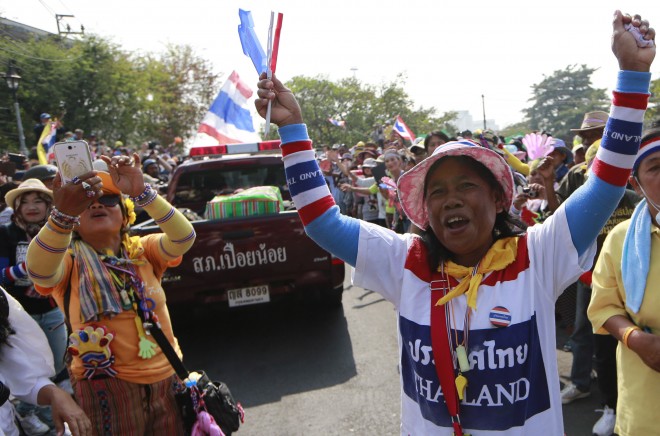Thai protest leader urges shutdown of gov’t offices in 14 provinces

Thai anti-government protesters celebrate as a police pickup truck runs out of the prime minister’s office of government house Sunday, Jan. 19, 2014 in Bangkok, Thailand. The leader of the series of anti-government protests in Bangkok urged protesters to “shut down” government offices in 14 southern provinces after an attack on a rally in central Bangkok injured 28 people Sunday. AP PHOTO/WASON WANICHAKORN
BANGKOK— The leader of the series of anti-government protests in Bangkok urged protesters to “shut down” government offices in 14 southern provinces after an attack on a rally in central Bangkok injured 28 people on Sunday, the second such assault in recent days on demonstrators staging “shutdown” protests aimed at toppling the Thai government.
Unknown attackers have killed several people during the months-long demonstrations intended to oust the embattled government of Prime Minister Yingluck Shinawatra.
Each side has blamed the other for the violence.
Sunday’s attack—twin blasts followed by gunshots at a busy intersection occupied by the protesters—heightened fears of growing violence before elections called by Yingluck for Feb. 2.
A protest leader told reporters “an explosive device” was thrown into a crowd near a tent where he was sitting behind the main rally stage.
The crowd chased “suspects but one of them turned back and threw a second device,” said Thavorn Senniem, adding shots were then fired before the attackers escaped on motorcycles.
An AFP reporter saw blood-spattered clothes and a small crater at the scene of one of the blasts.
Twenty-eight injured people were taken to several city hospitals after the attack, a health official said.
“Seven of them are seriously injured… it’s likely to be from shrapnel,” Suphan Srithamma, the head of the Department of Medical Services, told AFP.
The capital’s Erawan emergency center confirmed the toll, adding in an update that nine of the 28 were later released from hospital.
The firebrand leader of the rallies said protesters would not be cowed by violence and vowed to extend the action across the southern provinces on Monday.
“They attack us almost every day and night, even though we come with empty hands and never cause any damage,” former lawmaker Suthep Thaugsuban said at another rally site at the end of a daylong march.
“But no matter how many bullets or bombs, they can’t kill all of the Thai people,” he added, accusing the government of being behind the attack.
He also urged protesters to “shut down” government offices across 14 southern provinces.
Thailand has been rocked by bouts of bloody unrest since just before a 2006 military coup that ousted Prime Minister Thaksin Shinawatra. He now lives in self-exile overseas to avoid a jail term for corruption.
His younger sister Yingluck has clung on to power through more than two months of street rallies aimed at forcing her elected government from office and installing an unelected “people’s council.”
She has called the elections despite a vow by the main opposition party to boycott them and threats from the protesters to disrupt the polls.
Roadblocks bring inconvenience
The demonstrators have staged a self-styled “shutdown” of the city since last Monday, erecting roadblocks and rally stages at several intersections including those in its commercial heart.
The action has brought inconvenience to the city of 12 million, but authorities say the numbers on the streets appear to be dwindling—although tens of thousands join nightly rallies.
The demonstrators are urging the military and independent institutions to bolster their attempt to block the election, which Yingluck is again expected to win.
Observers say widespread violence could prompt intervention by the powerful army in a nation that has seen numerous attempted or successful coups since it abandoned absolute monarchy in 1932.
“Peau Thai is very concerned (about the violence),” Thaksin’s legal adviser Noppadon Pattama told AFP, referring to the ruling party.
“We condemn the use of violence. Suthep (Thaugsuban) should allow the police to investigate fully and to provide safety for the protesters.”
On Friday one protester died and dozens were injured in a blast at an anti-government march in the city led by Suthep.
Police on Sunday said they were hunting two suspects captured on CCTV footage leaving the scene of Friday’s attack after joining the march.
The current wave of protesters is made up of a coalition of Thaksin’s foes among the Bangkok middle class, southerners and the pro-royalist elite.
But the ousted leader has strong support in the north and northeast, which has helped him or his allies win every election in Thailand this century.—Thanaporn Promyamyai